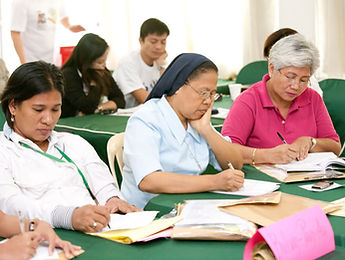
GPFF Philippines Receives Accreditation as a Service Provider for the Department of Education’s Alternative Learning System Program
Alternative Learning System: Promoting Rights of All Citizens
to Quality Education
Commenced on 2004, Alternative Learning System seeks to improve the quality of life in communities by raising the level of literacy on ‘target areas’ in the Philippines. Target Areas for the program are those areas with high illiteracy rate, a huge population of out-of-school youth and other communities where learners are deployed due to insurgency.
On the other hand, target learners for ALS include: unemployed and underemployed out-of-school youths and adults; elementary and secondary school drop-outs or leavers; industry-based workers, housewives, maids, factory workers and drivers; members of cultural minorities and indigenous people; persons with disabilities or physically challenged and inmates, rebel or soldier integers. Most of these target learners live below the poverty line, pre-dominantly coming from depressed, disadvantaged and underserved communities.
Moreover, three major programs are offered under the ALS Nonformal Education (NFE): Basic Literacy Program (BLP), Informal Education (InfEd) and Accreditation and Equivalency (A&E) Program.
Basic Literacy Program is an intensive community-based training designed for illiterate out-of-school children and/or adults. Informal Education is an educational activity that makes use of the life skills approach for personal development and focuses on addressing the needs and interests of the marginalized communities and other interest group of learners. Accreditation and Equivalency Program is comparable to a formal elementary and secondary education that offers a certificate of learning for the out-of-school youth and adults who are 15 years old and above who are incapable of attending or have dropped out of formal schooling. (A clear, successful example of an A&E student is boxing champion Manny Pacquiao.)
Through the Accreditation and Equivalency Program, a test passer of either the Elementary or Secondary Level gets a certificate which bears the signature of the Secretary of Department of Education. This allows a passer to mainstream in the educational system of the country. It offers him or her following opportunities: passers can enroll in post secondary courses in any college or university; passers have access to skills training programs; and any passers can acquire eligibility for government employment positions.
In line with the United Nations Millennium Development Goal number one which is “Achieve Universal Primary Education” and the international initiative, “Education for All” (EFA) 2015, GPFF-Philippines signed up to commit as a Service Provider for the Department of Education’s Alternative Learning System (ALS) during the 5-Day Training Workshop of Service Providers and Instructional Managers on the Alternative Learning System held at the Regional Educational Learning Center in Marikina City on April 11-15, 2011.





GPFF Receives Accreditation as Service Provider
and Instructional Managers
During the 5-day workshop headed by Dr. Virginia Silvestre, Alternative Learning System Chief for NCR-ALS, selected GPFF Instructional Managers not only learned the roles of Service Providers and Instructional Managers but also the depths of a Flexible Learning System and Self Instructional Learning Support Strategies which are significant in ensuring the achievement of ALS goals. They also learned the basic how-to’s on the recruitment of learners, roles and an ideal ALS learning center and sustainability of learner’s motivation.
While formal education is given on school grounds, ALS conducts its classes in Community Learning Centers like Barangay halls, sports centers, and even at the homes of the learners and playgrounds. This makes ALS programs more accessible to these learners. Methods of teaching include face-to-face, modular, study groups, print and audio-based learning, self and interactive learning, tutorial, mentoring and even home visits. In terms of languages of instruction, these can be local languages or dialects, Filipino or English depending on the programs the learners are in.
In GPFF-Philippines’ case, the Community Learning Centers are situated in four areas in Metro Manila: each in Caloocan City, Malabon City, Quezon City and Makati City. Every class consists of a minimum of 25students, duration of a ten-month learning experience, while the schedule will depend on the student’s availability.
Since the primary goal of ALS is to promote the right of all citizens to quality basic education, such education was made accessible by providing all Filipino children involved in the program a free education in the elementary and high school level. Such education also includes alternative learning system for adult learners.
GPFF also received a Certificate of Recognition from the Department of Education as a Service Provider during the closing ceremony, while its envoys, Ms. Sharleen Tomobe (Founding Trustee, GPFF-Philippines), Mr. Emmanuel Bienvenido Marquez (Executive Director, Service for Peace-Philippines), Ms. Pricila De Guzman (Project Coordinator for Education, GPFF-Philippines), Ms. Nora Mollera, Ms. Maricel Castro and Ms. Venus Laceste (Service for Peace-Philippines), received their Certificates of Training as active participants in the workshop.
“The participants will bring home the bacon emulating the spirit of cooperation and collaboration absorbed during the training workshop. This will also be a strategy especially when we teach these things to the out-of-school youths and adults. This would be an unforgettable experience as we take a stern towards the challenge of social and economic change, and the reduction of poverty in the country,” one educator shared during the closing ceremony.
Aside from free education, also part of the ALS goal is to give educational opportunities to those marginalized groups that are deprived of education because of poverty, disability and geographical locations.
